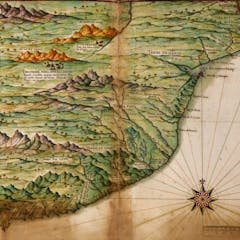
Articles on African languages
Displaying 1 - 20 of 45 articles

It reads powerfully in the Shona language, and is one of two of her books newly translated into it.

The history of the coastal communities of east Africa shows how ethnic groups and their languages were shaped.

Variations of English names reveal the enduring effects of British rule - but there’s also a return to tradition.

By the 1950s a standard version of the language emerged, today spoken by an estimated 200 million people.

Studies of African multilingual contexts are almost non-existent in high-impact scientific journals.

Novelist Petina Gappah’s call for translators on Facebook has resulted in the publication of Chimurenga Chemhuka.

Reading fluency and expanding vocabulary are the bridge from decoding to comprehension. Weaknesses in any of these building blocks will limit a child’s ability to read for meaning.

Making South African Sign Language official is more symbolic than useful in the lives of a very marginalised community.

Missionaries and African translators working on local versions of the Bible divided South Africa’s ethnic groups by language.

There’s a new wave of indigenous language podcasts that could attract big new audiences.

The first speech sounds were uttered about 70,000 years ago and not hundreds of thousands of years ago as is sometimes claimed.

Indigenous knowledge, African languages, queer rights and Afrofuturism are some of the issues discussed in the new book.

Over two millennia, Swahili has built bridges among people across Africa and into the diaspora.

Reconstructed vocabulary sheds light on cultural items and people’s habitats, including the spread of ideas and the importance of certain concepts.

There is something beautiful about African languages carrying science, fictionalised of course, into imagined futures.

Students from São Tomé and Príncipe must negotiate being both native speakers of Portuguese and Black Africans. And how they speak Portuguese is perceived as an issue.

The documentary resulted in the creation of an active translation network.

A realignment is needed as the current systems have lost the competence to midwife a new nation out of the formative experiences of the last 25 years.

Police officers are also not, and are not expected to be, sworn translators or interpreters. This has serious implications for justice.

Research has shown that African immigrants in South Africa refrain from speaking their own languages and try to speak local languages to blend in.
